#Elsa Sjunneson
Text
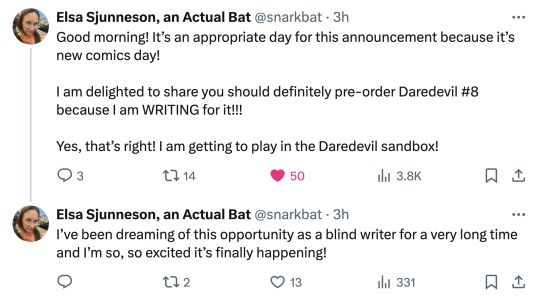
HUGE NEWS!
In 2020, Elsa Sjunneson became the first blind writer to work on Daredevil when she included a Matt Murdock cameo in the audio serial Jessica Jones: Playing With Fire. Now, finally, she is getting to write the actual comic, at least for one issue, hopefully opening the doors for more DD work in the future!
Here is the solicitation for Daredevil volume 8 #8, which is slated for publication in April:
"A dragnet is closing around Matt Murdock, A.K.A. DAREDEVIL! Police on both sides of the law are hunting him, something vicious with a deep connection to Matt’s very soul is hunting his friends and, in the midst of that chaos, an old foe with the blood of Matt’s closest allies on his hands returns…"
The writing credits for the issue are "Saladin Ahmed & more", so presumably, Sjunneson is included in "& more". April cannot get here fast enough, as far as I'm concerned. I'm very excited, for her and for the comic as a whole, which has gone far too long without input from blind/visually impaired creators.
#FINALLY!!!#Elsa Sjunneson#Daredevil vol. 8#Daredevil#Matt Murdock#News#Quotes#Solicitations#ID in alt text
216 notes
·
View notes
Text
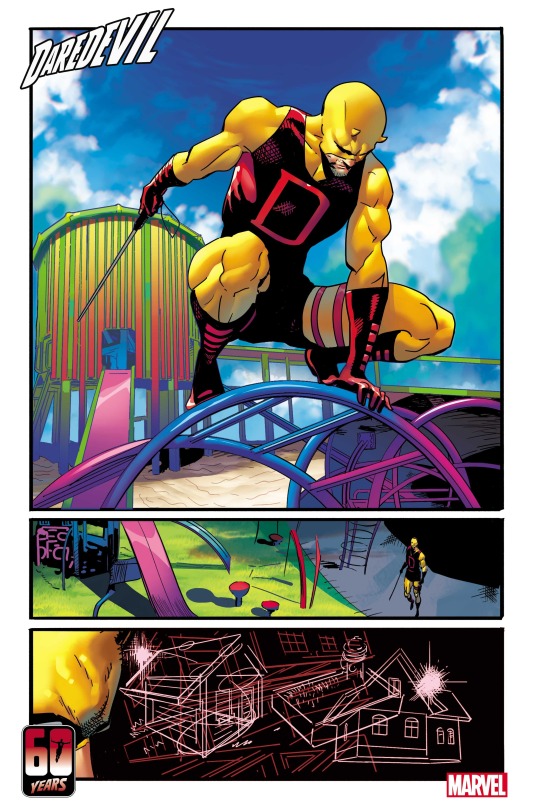
Preview page from Daredevil #8 (Marvel, April 2024) by writer Elsa Sjunneson and artist Eric Koda
3 notes
·
View notes
Text
Author Spotlight: Elsa Sjunneson
A look into the life and work of award-winning author, editor, media critic and disability rights activist, Elsa Sjunneson.
2 notes
·
View notes
Text
Spring/Summer 2022 Favourite Reads
More suggestions from my bookshelf. #summerfavourites #favouritebooks
Read my Spring/Summer 2022 Favourite Sounds here.
Alfabet/Alphabet: A Memoir of a First Language by Sadiqa de Meijer
Winner of the 2021 Governor General Literary Award for Non-fiction.
Finding this book about the adjustment from Dutch language and culture to Canadian was somewhat serendipitous, since my father made the same journey a few years before I was born. De Meijer’s story offered me…

View On WordPress
#ableism#disability justice#disability representation#Disability Visibility#Elsa Sjunneson#feminism#Koa Beck#Sadiqa de Meijer#Thomas King#white feminism
5 notes
·
View notes
Text
Preview: Daredevil #8
Daredevil #8 preview. A special oversized issue marking 60 years of Daredevil! #comics #comicbooks #daredevil

View On WordPress
#aaron kuder#ann nocenti#comic books#Comics#d.g. chichester#daredevil#elsa sjunneson#eric koda#erica schultz#frank miller#j. scott campbell#jan bazaldua#john romita jr.#ken lashley#marvel#saladin ahmed#stefano raffaele#stephen segovia#tommaso bianchi#ty templeton
1 note
·
View note
Text
Blind and Deaf Woman, becoming Hellen Keller
Blind and Deaf Woman, becoming Hellen Keller
Betsy Wurzel’s guest is Elsa Sjunneson a Media Studies Professor, Historian, Media Critic, Editor, Writer, Author, 2 Time Hugo Award Winner, 9 times finalist, and Aurora Award Winner for her editorial work on Uncanny Magazine.
Elsa was featured on PBS American Masters Documentary, “Becoming Helen Keller”. Elsa Sjunneson is a Deaf-Blind Disabilities Rights Activist, LGBTQ + Activist…

View On WordPress
#kickalzheimersassmovement#Ableism#Aurora Award Winner#Author#Betsy Wurzel#Blindness#Critics#Deaf#Disability#Discrimination#documentary#Elsa Sjunneson#Helen Keller#Historian#Hugo Award Winner#LGBTQ+#media#Media Studies Professor#PBS#Physical Assualt on Disable Women
1 note
·
View note
Text

The Sunday Morning Transport sets off with a fantasy from Elsa Sjunnesson in which sometimes even an oracle can discover things they do not know. Today's story is free for everyone to read. https://www.sundaymorningtransport.com/p/the-found-recollections-of-revalors
One story a month is free for all, and starting Wednesday, a bonus story from our archives will be made available for everyone! Subscribe if you want to get these in your inbox.
#science fiction#fantasy#short stories#short fiction#writing#elsa sjunneson#sunday morning transport
1 note
·
View note
Text
Blind to information. / Blind to the truth. / Blind to their pain. / Blind to the names of the writers.
Not seeing, here, is equated with a lack of knowledge, not with a lack of the faculty of sight. We’re not talking about literal blindness, we’re talking about ignorance, and when we equate ignorance with disability we’re assuming that people with blindness aren’t knowledgeable.
-Elsa Sjunneson, Blind Reading is in Braille or Large Print
#elsa sjunneson#ds#on writing#mp#another uptick in posts on the dash responding to ignorance#by equating ignorance to blindness#and idc the context i'm annoyed by the trend#tbd
1 note
·
View note
Text

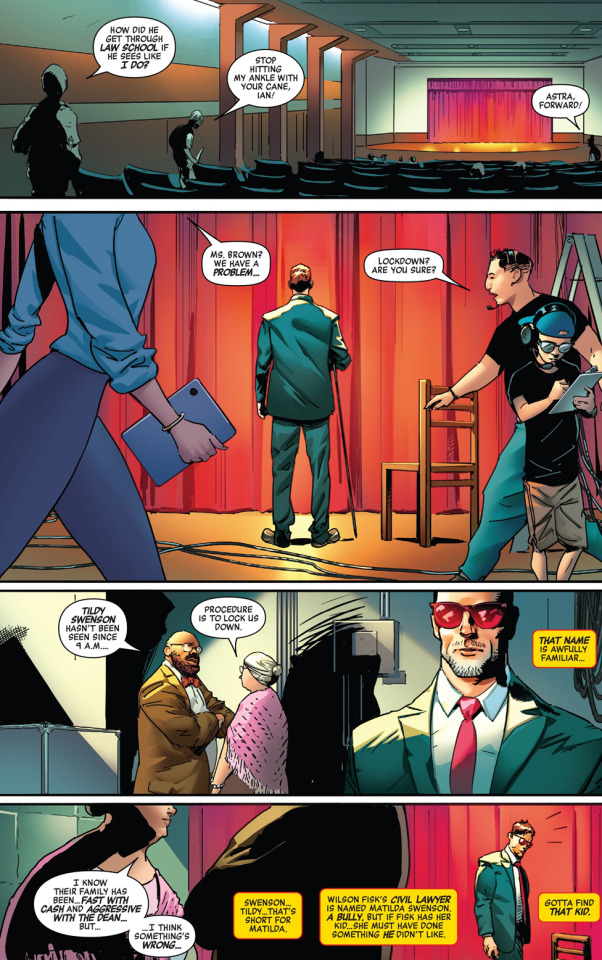


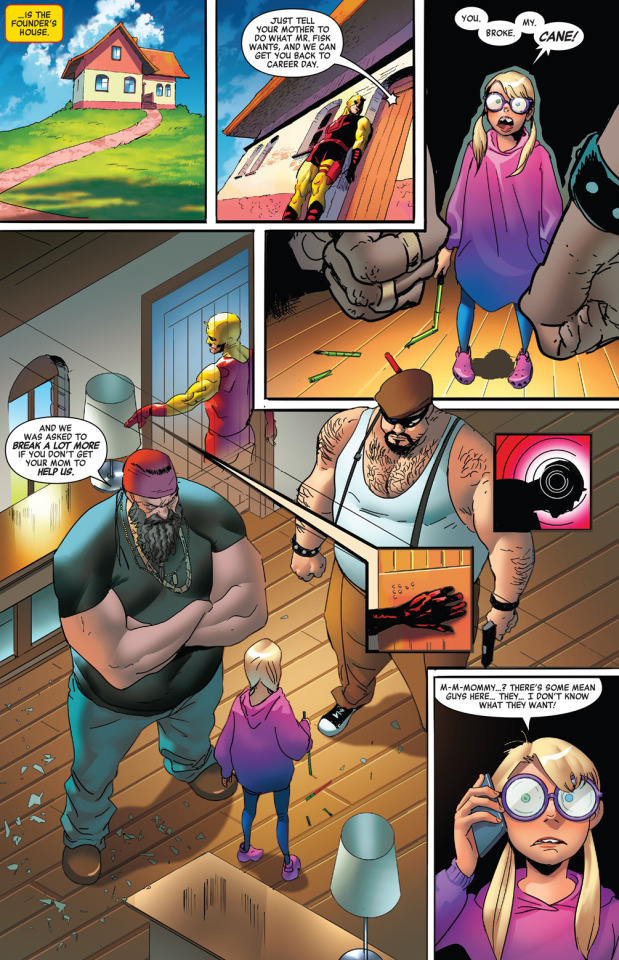
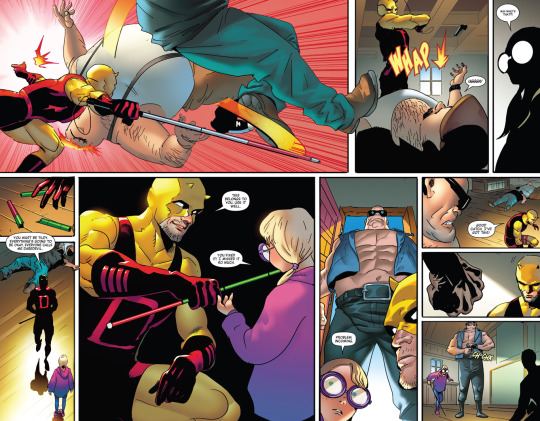

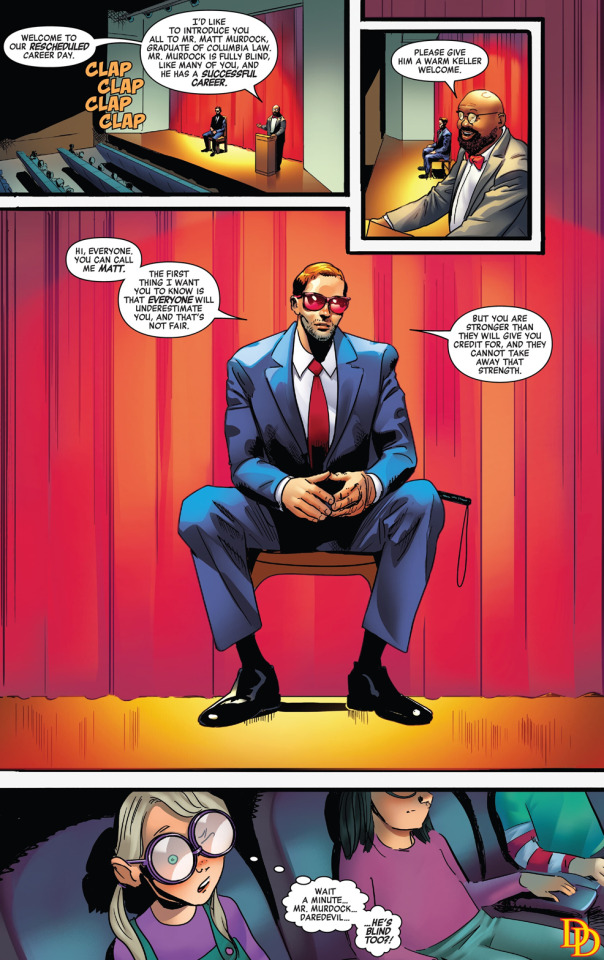
Daredevil #8 - "Blind Leading the Blind" (2024)
written by Elsa Sjunneson
art by Eric Koda & Ceci De La Cruz
141 notes
·
View notes
Text


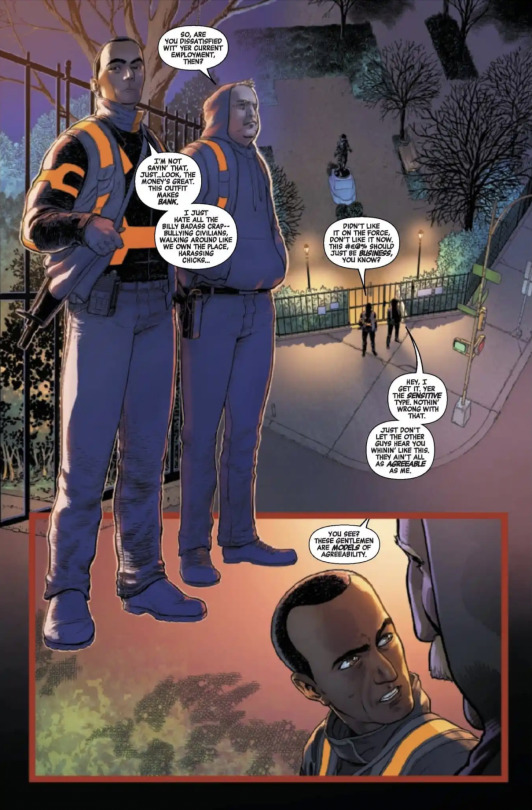

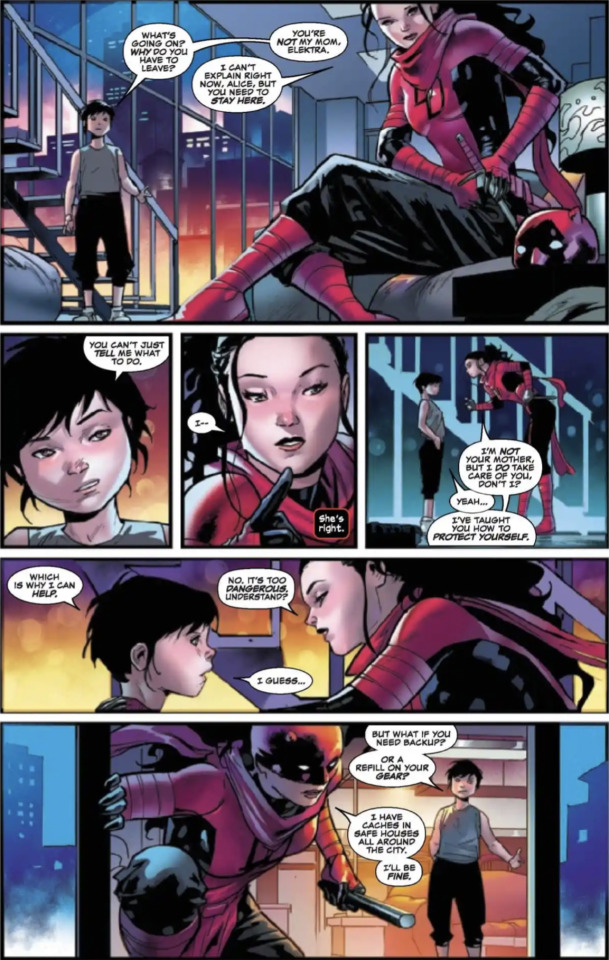

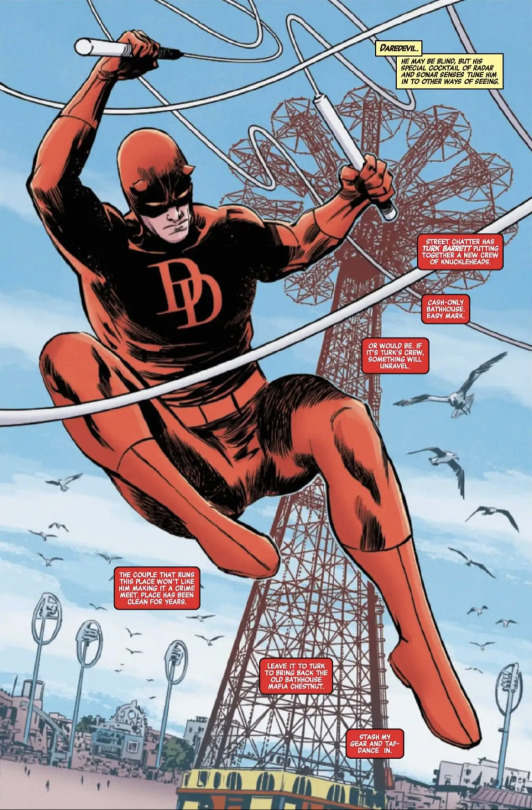

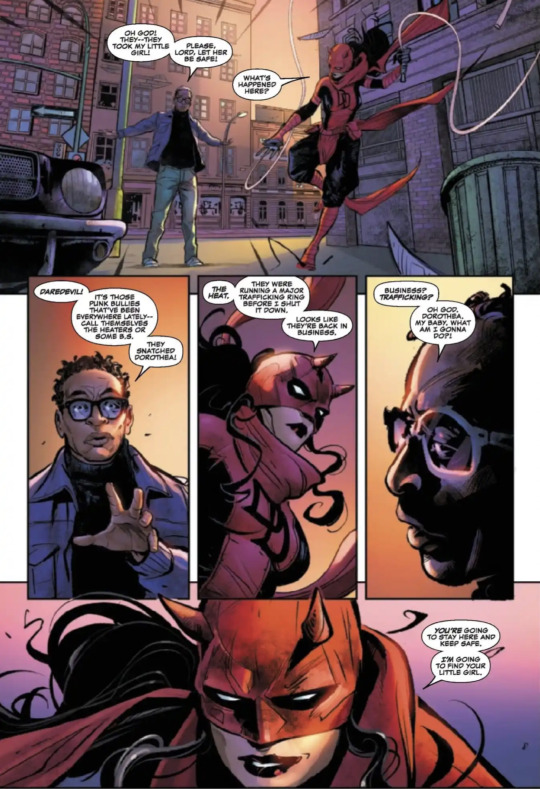
Preview of Daredevil vol. 8 #8, the special 60th anniversary issue, by Saladin Ahmed, Aaron Kuder, Jesus Aburtov, Ann Nocenti, D.G. Chichester, Elsa Sjunneson, Erica Schultz, et al., in stores April 24!
#I'm very very excited for this.#Wednesday spoilers#Daredevil vol. 8#Daredevil#Matt Murdock#Elektra Natchios#Punisher#Frank Castle#Turk Barrett#Previews#Now do Iron Fist!
19 notes
·
View notes
Note
any fics? books? shows? to recommend or just on your mind. need something to distract the good ol’ mind
sure! i can recommend a few things 🥺🥺 i’m on a short-form sci-fi kick so i’m mostly going to rec my favourite stories from my beloved Uncanny Magazine. These are all specially curated by me & they are extremely good 🥰🥰🙏💖
Poems Written While by Natalia Theodoridou
The House on the Moon by William Alexander
Bones in the Rock by R.K Kalaw
By Claw, By Hand, By Silent Speech by Elsa Sjunneson and Merc Fenn Wolfmoor
She Still Loves the Dragon by Elizabeth Bear
Pathfinding! by Nicole Kornher-Stace (this one is especially 🫠🫠🫠)
for books i have dozens i could recommend but these occur to me right now
The Last True Poets of the Sea by Julia Drake
Red Sister by Mark Lawrence (begging you all to read these books begging and pleading and crying and begging)
This is How You Lose the Time War by Amal El-Mohtar and Max Gladstone
Axiom’s End by Lindsay Ellis
She Who Became The Sun by Shelley Parker-Chan
Temeraire by Naomi Novik
Hell Followed With Us by Andrew Joseph White
i could go on forever but this is i guess something to hopefully get you started 🥺💖 maybe ask me about fics separately? i have a lot of those i really love too 🥰
#sorry this took a while i’m low on the old spoons. but trying!!#those stories from uncanny mag are wonderful i promise#anon#ty for the ask 🥰🥰 got to read some old favourites as research 🥺🙏💖💖#all of these are on-par to me i think they’re astoundingly good and v. caspercore
22 notes
·
View notes
Text
Trope Discussion: Blind Characters Feeling Faces
[A less-detailed summary or TLDR is provided at the end.]
This might be a funny one to many readers, although I feel like writing about it was inevitable.
Some would argue this topic isn’t exactly going to change the lives of blind people. It probably isn’t that serious to some, while others have argued strongly that it can negatively influence blind people’s perception of themselves. I have, however, never found a trope so commonly hated as this one. As diverse as our opinions are about certain topics, the trope of feeling faces is more likely to receive a negative reaction compared to other tropes that may draw mixed reactions.
Here are a few examples of blind people’s feelings on touching faces:
-an article by DeafBlind writer and activist, Elsa Sjunneson-Henry
-a Twitter post by a DeafBlind person with a few DeafBlind and blind people replying
The thread is started by Elsa Sjunneson-Henry, who states, “Y’all I need to do an entire fucking article on this whole “blind people touching faces” trope.” To which DeafBlind content creator, Kit Englard, responds that the trope is really weird and “not a thing”, at least outside of romantic or sexual contexts. Another blind Twitter user, @reannabaenana, also adds: “That trope always came off weird to me, even before I was diagnosed as blind. Like, how exactly does fondling somebody's face help you know them better?”
-this article on blindness in media includes the following about touching faces: “We don’t need to touch your face - often we don’t even care what you look like. I know a lot of media (including Daredevil) features the infamous “blind person touching their face” scene but this isn’t your average blind person behavior.”
-this article on top misconceptions about interacting with blind people includes this. “If the idea of someone groping your face gives you the heebejeebees, that’s normal… because it’s weird. People who are blind follow the same social conventions as anyone else, which means that it is highly unlikely they will want to have their hands all over the face of someone they are not intimately acquainted with. In fact, according to many visually impaired people, feeling someone’s face does not actually provide very much helpful information about a person’s looks. There are exceptions of course, such as for close family members or romantic partners. Parents who are blind will use their hands to familiarize themselves with their children’s features and children may feel the faces of the significant people in their lives.”
Another one on myths states this:
“People who are blind live by the same social conventions as everyone else. If you think having your face groped is weird, you’re right, and a blind person isn’t going to want to have their hands all over someone they aren’t intimately close with either. Some exceptions could include romantic partners, children with vision loss familiarizing themselves with significant family members, and blind parents getting to know their child’s features.”
On TikTok, Molly Burke, who is a blind YouTuber and influencer, had this to say: “There is a big misconception that blind people feel faces. As a blind person who has many blind friends I don’t personally know any blind person who feel faces. Not that they don’t exist. Some people who are blind and Deaf or who are blind and have cognitive disabilities do use that to connect with friends, family, loved one, but certainly none of us just go around feeling stranger’s faces.”
Molly adds that she has never felt anyone’s face outside of a joke.
@askablindperson also contributed the following:
“I am a high partial blind person with LCA since birth, and personally I have never felt faces nor felt particularly interested in doing so from a blindness perspective. Granted, my love language is definitely touch, and I’m also very physical with partners, so I am interested in touching faces in the sense of a lovers caress or poking their nose and things along those lines, but I’ve never felt particularly interested in touching faces for the sake of exploring them non-visually with my blindness in mind. I do have a lot of residual vision, so at least for me, I’ve never felt any particular need to satisfy my curiosity because I can always look at pictures and zoom in as much as I want, so I feel like I have a pretty solid library of what faces are like.
That being said though, I’ve also been heavily involved in blindness community for the last 10 years, and I don’t think I’ve ever met more than one or two blind people in all of the thousands I’ve encountered who have expressed an interest in touching faces. Typically, in my experience, most of the people I have seen take interest in touching faces have been new to blindness, or not very comfortable with their blindness, or maybe still in one of those early acceptance faces of romanticizing their blindness and thinking of it in the ways the media has taught them to. It often seems to be blind people who may be dealing with a lot of internalized ableism and still enjoying things like inspiration porn. I don’t think that’s universally the case for everyone, but it does seem to be the general trend in my own experiences.
I have never been fond of the portrayal of blind people feeling faces in media. It seems like it’s almost a staple for almost every blind character in media, even though in reality, I’ve only met maybe three out of a thousand who’ve ever expressed interest in doing so. At the very least it feels like a gross exaggeration and misrepresentation of the community and thinking of blind people as a monolith who must all universally want or need this experience.
Even more than that though, I think it reinforces this idea that knowing what a person physically looks like is a fundamental building block for understanding the world and finding fulfillment in it, which I do not believe to be true. It seems to reinforce the idea that you don’t truly know a person until you know exactly what precise configuration all of their fleshy face lumps happened to form into, which I just don’t jive with. I think it’s yet another way that the media often portrays blind people as fundamentally lacking something unless you give them some form of visual access, whether that’s seeing through the eyes of a magic animal, or relying on a dog or human guide over a cane, or describing family photos to them in detail, or having them feel all over a person’s face.
It reminds me of all of those sob stories about how tragic it is that you’ll never be able to see your family smile, as if seeing it makes the experience any more valid and real. As if that moment with that person is just about physically seeing the skin and meet on the face shift around, rather than hearing them smile through their voice or listening to them laugh or the simple fact that you are sharing a moment of joy with that person. Because, to me, at the end of the day, that relationship is built on the joy you are sharing, not on whether or not you can hear or see the physical manifestations of that joy. What matters is that you know that person is smiling and happy, not the way in which you know it.
I think it can be a harmful idea to put in the heads of real life blind people, too, because it can leave them getting caught up on whether or not they can physically see their family smiling on their birthday, leaving them feeling sad and lost on holidays instead of being able to fully be present in the moment and just enjoy the joy they are sharing with those people in that very moment. Not only does it tell sighted people that unless we feel faces, we are missing something fundamental and must all crave visual representations of things because vision must always be better and more trustworthy, but it also tells blind people that that’s what they should want and focus on and worry about when losing vision, which is a recipe for rumination and fixation and depression. It sells this idea that the experience isn’t complete without knowing the minute details of a person’s facial fat and muscle distribution, which is just silly when you think about it like that.
As you can tell, I have a lot of strong opinions about this particular topic. I don’t believe in casting judgment on those blind people who may be interested in touching faces, especially if it turns out they are still in the process of truly accepting their blindness or just have some idle curiosity, but seeing a face touching seen in the media is a pretty sure fire way to get me to grown out loud and close the show entirely for a few minutes to go rant about it.”
A Few Examples From Media
I cannot find a specific origin of this trope. However, it is so common that I often find it in media in addition to many things I beta read. For example, it is mentioned in Daredevil, according to this article. “Foggy says Matt has touched his face, Karen wants him to touch hers, and Foggy notes that Matt has touched the faces of many women he’s brought home. The show makes it seem as if this is the only way a blind person can get a visual of another person, or that it’s essential to relationships.”
And in the book Blind by Rachel DeWoskin, two blind characters feel each other’s faces to see what they look like. In the scene, both characters, Sebastian and Emma, attend a school for the blind. During a break imagining shapes of clouds, Sebastian asks to feel Emma’s face. The scene reads:
‘But then out of nowhere, Seb quit with the fake clouds and said, “I want to see what you look like.” Maybe he’d heard me hating it, hating him, hating Briarly, hating being blind.’
Emma gives permission and the description follows:
‘He reached over and took what seemed like hours, tracing my face with his fingers, moving them through my hair and then slowly down my forehead to where my sunglasses were.’
It continues: ‘Sebastian kept his on me, skipping the band around my eyes and feeling my mouth instead, my chin, my throat.’
Next, Sebastian invites her to touch his face, saying, “Here’s what I look like, Em.” What follows is a paragraph of what he looks like. Afterward, Emma thinks, ‘Maybe that new, 3-D feeling could become my own kind of vision’.
With such examples in mind, this trope is defined by the idea that blind people not only want but need to touch people’s faces.
Why Does This Matter?
This is not something blind people do regularly. This is not a typical greeting in blind spaces. This is not something unique to or necessary in blind culture. The scenes in media present touching faces as a natural, expected part of the blind experience, a way for us to connect. That is not considered authentic for many of us. Which means writers need to be more aware of their choices and the thought processes behind them.
Feeling faces happens constantly in media. It rarely happens in real life.
Why Don’t We Touch People’s Faces?
Several possible reasons include:
-cultural reasons
-hygiene
-injury, whether irritating an existing injury or accidentally causing one
-sensitivity to touch
-trauma
-cultural and individual values of personal space or lack of displays of public affection
-cultural and individual values of bodily autonomy
-lack of a desire to touch faces
-and more
Touching someone without permission is a bad idea. Again, this is not an established, expected part of blind communities. Portraying it as common for blind people in fiction is inaccurate, especially for strangers.
Blind people don’t need to touch faces. And blind people don’t need or necessarily want their faces touched either just because they are blind.
What Happens In This Trope?
This trope exists when a blind character touches another character’s face, usually because of a desire or need to see what the other looks like. The other character can be blind or not blind. Sometimes the other character touches their face in return.
In all the examples I can find, the blind character touching faces is totally blind.
Again, this trope is about the blind character learning what the person’s face looks like. This doesn’t work for a few reasons.
Blind people absolutely care about appearances and fashion, particularly their own. But not everyone is struck by the immediate need to know what their boss looks like. Or a stranger’s face. Or even their lover’s face, in some cases.
This isn’t something blind people need to do solely because they can’t see.
Another, bigger problem is the idea that blind people can only connect if they learn what the other person looks like. This is not true.
Markers of This Trope
The character who feels faces is portrayed as totally blind.
The character asks to feel someone’s face or is otherwise motivated by the desire to know what the other person looks like.
This is portrayed as a typical experience of blind people everywhere.
The touch allows the blind character to explore the other’s face. It is not a simple caress.
Touching faces is portrayed as allowing the blind person to connect with the other, such as in the example I provided from the novel, Blind.
Should Face-Touching Scenes Be Included in Stories?
I’m not entirely against it. Lovers often touch or hold each other’s faces. Caregivers may touch the faces of small children.
However, gently cupping someone’s face as a sign of affection is very different from the trope.
One difference is that people who aren’t blind also touch faces in that manner. It isn’t specifically connected to blindness.
Another difference is the motivation behind the action. The touch is not motivated by trying to figure out what the other person looks like.
The trope also usually shows the blind person running their fingers over the entire face, rather than focusing on one part. For example, it is usually, “Let me show you what I look like” rather than “One of my eyebrows is a funny shape. Wanna see?” or “Let me see your new earrings.”
Ideas For What To Do Instead
If you decide you don’t want to write the typical face-touching scenes, here are a few ideas for alternative scenes.
If your blind character wants to know what someone looks like, have someone give verbal descriptions. This can also help for things that are not tactile, such as make-up, tattoos, or other markings. Feeling someone’s face doesn’t tell you as much about appearance as one might think.
Another alternative is to give the character a motive for touching faces other than figuring out what someone looks like. Are they doing it to express affection? Are they trying to get someone’s attention? Are they teasing the other person?
It also helps to consider the character’s culture and how touching someone’s face is understood. Are they culturally permitted to touch anyone’s face or only a lover? What about family? And does the setting matter? Same with age: a child feeling the face of family member because they are curious is going to read differently.
I would also like to add that many writers write about touching faces and learning what someone looks like as a sign of intimacy between two characters. I wonder if writers could find other ways to show intimacy. I wonder if they might explore why their blind character feels the need to know what someone looks like. I wonder what alternatives are not being explored.
Consider alternate motivations for your characters and perhaps a different way of doing things than you may have previously.
Maybe instead of touching each other’s faces, Sebastian and Emma could have held hands and actually talked about their feelings. Or maybe Emma, as a newly blind person, believes the stereotype about touching faces and wants to try it for herself. Perhaps Seb has a different opinion on it.
Rather than touch Karen’s face in Daredevil, Matt doesn’t need to do so to feel connected to her. Perhaps the show could show intimacy through little moments, such as the couple doing sighted guide without needing to talk about it.
Perhaps instead of relying on overused and often disliked tropes such as this one, writers could use their creativity to explore something new.
Maybe instead of assuming all blind people feel faces, stories could explore the different attitudes toward it, the different conditions under which people do it, like the various attitudes from blind people I shared at the start of this post. Although this would require more than one blind character, which many creatives are surprisingly hesitant to include.
Additional Thoughts on Blindness
I wrote that the characters touching faces are almost always totally blind. I feel that it would be a lost opportunity for readers if I didn’t mention that most blind people can see.
Percentages of totally blind people vary according to source, but the American Foundation For the Blind estimates about 15% of blind people are totally blind. Some sources say 20%. That leaves roughly 80% to 85% of blind people with light perception, at least. This includes people with more vision than that as well.
This means that the idea that all blind people have no idea what their loved ones look like isn’t strictly true. Remembering that many people on the blindness spectrum have some remaining vision is important to portraying blindness. Additionally, vision is not static. It can change over time.
I would like add another alternative here.
Perhaps your blind character has some remaining vision. Imagine the new things they could discover about someone they love when they can get close enough. That, to me, is much more realistic and intimate than touching someone’s face.
In the end, it is up to each writer if they want to include such scenes in their work. I hope that this post can provide some questions to consider and perhaps spark some fresh ideas. Writers who choose to include it might even do so in a unique way. As with everything on this blog, all I want is for writers to think about what they write and why.
TLDR:
Blind people typically dislike face-touching scenes or often feel unsatisfied with them, as they reinforce the idea that blind people cannot connect with others, prioritize visual information over other forms of connection, ignore different types / stages of blindness, and rarely show differences in opinions of blind characters regarding feeling faces. Feeling faces also does not provide as much information as people may assume, such as about make-up or facial markings. Alternatives include:
-consider different ways your characters can gain information about appearances
-show differences in blindness
-consider that many blind people have some vision
-show blind characters having different opinions on feeling faces - for example: Molly Burke, a blind YouTuber, suggests that some DeafBlind people may feel faces to connect with others, whereas Elsa Sjunneson-Henry, who is DeafBlind, states in a Twitter thread about blindness and feeling faces: “none of us do it”. As another example, @askablindperson writes that some people who are new to blindness may feel faces either because of discomfort with their blindness or because of internalized ideas from media. While the idea of feeling faces was largely given pushback in everything I found about it, some people suggested times where it might be used. Show this diversity of opinion, if not action, in your blind characters as well.
-factor in culture, age, etc
-write different ways of showing intimacy between characters
-consider motivations for touching faces that aren’t based in figuring out what the other person looks like
-consider any bias in the idea that seeing loved ones is the only way to connect with them
I hope this helps.
[For anyone reading who doesn’t already follow me, I provide sensitivity reading for blind characters and answer questions for writers. See my pinned post for more information.]
This post has been cross-posted onto WordPress where it was previously shared here.
590 notes
·
View notes
Text
Update: 10.03.2024
Fixes:
"Themes & Tropes" can now be accessed from the header bar
Updated tags on entry "'Being Seen'- Sjunneson, Elsa"
Added:
Category for "Deafblind"
Category for "Hearing and Visual Disability" (Dual category; Separate from singular "Hearing Disability" and "Visual Disability" categories)
Aesthetic Fixes:
Other:
"Hearing Impairment" is now "Hearing Disability"
"Visual Impairment" is now "Visual Disability"
7 notes
·
View notes
Text
Exclusive Preview: Daredevil #8
Daredevil #8 exclusive preview. A special oversized issue marking 60 years of Daredevil! #comics #comicbooks #daredevil
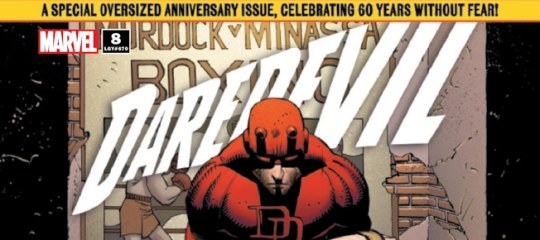
View On WordPress
#aaron kuder#ann nocenti#comic books#Comics#d.g. chichester#daredevil#elsa sjunneson#eric koda#erica schultz#exclusive#featured#frank miller#j. scott campbell#jan bazaldua#john romita jr.#ken lashley#marvel#saladin ahmed#stefano raffaele#stephen segovia#tommaso bianchi#ty templeton
1 note
·
View note
Text
Tagged by @aeide, @alkibiadessuperfan, and @artschoolglasses. Thank you, my loves!
Get to know a mutual better!
LAST SONG: Bullet by Tula
FAVOURITE COLOUR: Cyan 💙
CURRENTLY WATCHING: gotta finish the last three-ish episodes pf The Righteous Gemstones and I really need to finish Vikings already bc it has now been... two years. And I don't even like it but I need to know how it ends. 😭
LAST MOVIE: gd I don't even remember the last movie I watched. 💀 Might have been Nimona?
CURRENT READING: In between books at the moment, but I want to start reading Sword of the White Horse by Elsa Sjunneson and Pride and Prejudice next.
SWEET/SPICY/SAVORY: Savoury!
LAST THING GOOGLED: "How much to tip a tattoo artist" for aeide ajsdgja
CURRENT OBSESSION: Deeply annoyed about how things ended for Shin and Baylan on Ahsoka (A Star Wars show? Disappointing? I can't even imagine!) and I've been turning over ideas for a backstory for them in my head that I'd love to write some day. But I definitely don't have the spoons for writing Star Wars fic right now. 💀 Also my Eivor x Leofrith longfic and just them in general, as has been my constant state of being for the past year and a half lmao
CURRENTLY WORKING ON: Honor Bound chapter two! (In theory. Maybe if I talk about it enough the words will come easier 😭) Also an angsty little one shot about them that's a lot more canon compliant because I have no self control <3
Tagging @xinamiguel, @ladyahsoka, @ainulindaelynn, whoever else wants to do it may consider themselves tagged 🤪
10 notes
·
View notes
Photo

Hello everyone!! For today I have another review for you. I have said it before but I really like the novels set in the Assassin's Creed world. I think that they are well written and with excellent world building. Sword of the White Horse by Elsa Sjunneson was no exception. This one is another Assassin's Creed novel that I really enjoyed. It is an original saga set in the world of Assassin's Creed Valhalla and we have a Celtic warrior defending her people from Viking raiders and infiltrating an ancient sect to save her homeland. As always I loved the world building and I really enjoyed the writing style as well as the storyline. The author does a great job combining history with mythology and the Assassin's Creed world. The book is a page turner and it's adventurous and at the same time dark. I highly recommend it if you are a fan of the games but also if you like Norse Mythology inspired books. Rating: 4 Stars *** #AssassinsCreedValhallaSwordoftheWhiteHorse #NetGalley #AssassinsCreed #ElsaSjunneson #review #bookreview #fantasyreader #fantasybook #bookaddict #bookcommunity #readingismagic #bookblogger #bookreviewer #greekbookstagram #instavivlio #vivlio #diavazo #eucitesc #mybookfeatures #over30sbookstagram #bookstamums #booknotes_athina (at Sitia , Crête) https://www.instagram.com/p/Cn95Y7GLXLt/?igshid=NGJjMDIxMWI=
#assassinscreedvalhallaswordofthewhitehorse#netgalley#assassinscreed#elsasjunneson#review#bookreview#fantasyreader#fantasybook#bookaddict#bookcommunity#readingismagic#bookblogger#bookreviewer#greekbookstagram#instavivlio#vivlio#diavazo#eucitesc#mybookfeatures#over30sbookstagram#bookstamums#booknotes_athina
1 note
·
View note